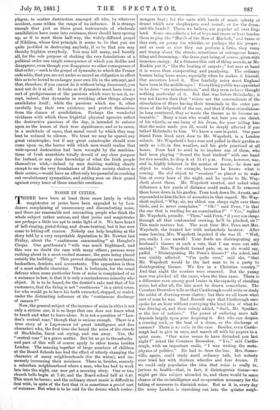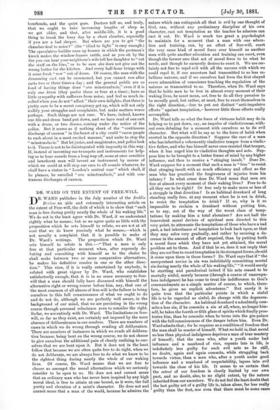NOISE IN CITIES.
THERE have been at least three cases lately in which magistrates or juries have been appealed to by Lon- doners complaining of unnecessary and discomforting noise, and there are reasonable and unexacting people who think the whole subject rather serious, and that juries and magistrates are perhaps a little too apt to make light of it. We have heard of bell-ringing, pistol-firing, and drum-beating, but it has now come to letting-off cannon. Nobody can help laughing at the story told by a very respectable deputation to Mr. Newton last Friday, about the "continuous cannonading" at Hengler's Cirque. One gentleman's "wife was much frightened, and this was no doubt the case with many others ; persons were rushing about in a most excited manner, the guns being placed outside the building." This proved disagreeable to merchants, booksellers, dentists, and accountants. The opposition is thus of a most catholic character. That is fortunate, for the usual defence when some particular form of noise is complained of as a nuisance in law, is that it is only a cantankerous minority who object. It is to be hoped, for the dentist's sake and that of his customers, that the firing is not " continuous " in a strict sense,
• for who would go to have his teeth extracted, stopped, or scaled, • under the distracting influence of the "continuous discharge • of cannon P"
Now, the general subject of the increase of noise in cities is not only a serious one, it is so large that one does not know what to touch and what to leave alone. It is not a question of "Lon- don's central roar," though that is serious enough. There is a true story of a Lapwoman (of great intelligence and fine character) who, the first time she heard the noise of the streets of Stockholm, burst out crying, and ran away. Yes, the "central roar" is a grave matter. But let us go to the suburbs and part of this will of course apply to other towns besides London. The massing together of large numbers of children at the Board Schools has had the effect of utterly changing the character of many neighbourhoods (for the worse), and im- mensely increasing their noisiness. There is, besides, scarcely a suburban neighbourhood where a man, who has had to work late into the night, can now get a morning sleep. One or two church bells begin at 7.40, and the Board-school bell at 8.40. This must be borne; and the ordinary street music is difficult to deal with, in spite of the fact that it is sometimes a genial sort of nuisance. But what is to be said for the drums which costes- mongers beat ; for the carts with bands of music (plenty of drum) which new shopkeepers send round ; or for the drum- and-fife bands ? These, we believe, are popular all over Eng- land. Some one collects a lot of boys and (more or less) teaches them to play the "March of the Men of Harlech," and tunes of that sort, on penny tin whistles, or perhaps the fife proper ; and as soon as ever they can perform a little, they ramp and tramp about the streets, sometimes at outrageous hours, lifing and drumming,—the drum part being, of course, given with immense energy. At a distance this sort of thing sounds, as Mr. Ruskin put it, "like the beating of carpets ;" but near at hand it is worse than exasperating and paralysing. The ordinary human being loves noise, especially when lie makes it himself. Our ancestors loved it. How fearfully noisy must England have been in the middle-ages ! Everything public was appointed to be done " ove minstraulxcie," and they seem to have thought nothing particular of it. But that was before Helmholtz; it was not known then that "noises are the concomitants of the stimulation of fibres having their terminals in the outer por- tions of the labyrinth of the ear, and that if these stimulations be long continued, they so waste the tissues as to become un- bearable." Many a nian who would not bate you one shriek of his whistle, or one hang of his drum, for your telling him that the noise made you ill, would be deeply affected if you talked Helmholtz to him. We know a case in point. Our poor friend Penn lived next door to Mr. Wapshott, in a London suburb. Mr. Wapshott's boys rose and yelled in their garden as early as 5.30, in fine weather, and his girls practised at all hours. Penn had to send in to implore one of them, who had been playing "Sound the loud timbre!" with one hand for five months, to drop it at 11.45 p.m. Penn, however, was, and is, highly tolerant in the matter of music,—he does not object to scales, for example, because he knows what is coming. He did object to " roosters " BO placed as to wake him at every hour of the night, and be spoke to Mr. Wap- shott about them. Mr. Wapshott snorted, and asked what difference a few yards of distance could make, if he removed them lower down in his garden. Penn took down Dr. Arnott, sad expounded to him the law of acoustics in that regard. Mr. Wap- shott replied, "Why, sir, my eldest son sleeps right over those birds, and he never complains." " Oh ! " said Penn, "is that the one that is reading for an examination ?" "Yes," replied Mr. Wapshott, proudly. "Then," said Penn, "if your son sleeps through all that confounded crowing, he'll be plucked, air !" This made matters hot. The next time Mrs. Penn met Mrs. Wapshott, she treated her with melancholy hauteur. After some fencing, Mrs. Wapshott inquired if she was ill. "Well, yes, really I am unwell ! Your fowls are disintegrating my husband's tissues at such a rate, that I am worn out with anxiety." Mrs. Wapshott turned pale, or, as she would say, pallid. "Disintegrating Mr. Penn's tissues ?" she asked, and was visibly affected. "I'm quite sure," said she, "that Mr. Wapshott would be the last man to be a party to disintegrating tissues. We live in a Christian country." And that night the roosters were removed. But the young man was plucked all the same, when the time came. There is a difference even among good brains in the capacity of standing noise, but after all, the line must be drawn somewhere. The Countess Brownlow tells us that Castlereagh could write or study the midst of drawing-room clatter ; but then we all know what sort of man he was. Earl Russell says that Castlereagh once spoke for an hour without conveying the least idea of what ho was driving at, and then calmly added, "Such, Mr. Speaker, is the law of nations." The power of enduring mere talk depends largely upon your despising it. But who can despise a crowing cock, or the beat of a drum, or the discharge of cannon ? There is no ratio in the case. Besides, even Castle- reagh had to give in once, and march off with his papers to a quiet. room. "Our noise seems to have disturbed you last night ?" asked the Countess Brownlow. "Yes," said Castle.. reagh, with an important smile, "I was writing the meta- physics of politics." He had to draw the line. Mrs. Somer- ville, again, could study amid ordinary talk, but nobody ever tried her with thirteen whistles and four drums. If we could only popularise the idea that noise is really in- jurious to health—that, in fact, it disintegrates tissue—we might get this subject attended to, and there would be some chance of the co-intelligence and co-operation necessary for the taking of measures to diminish noise. But as it is, every day the noisy London is stretching out into the quieter neigh- bourhoods, and the quiet goes. Doctors tell us, and truly, that we ought to take increasing lengths of sleep as we get older, and that, after middle.life, it is a good thing to break the busy day by a short slumber, especially if you are a bad sleeper. But where are you to get "the chamber deaf to noise ?" (the "blind to light" is easy enough.) The speculative builder runs up houses in which the postman's knock makes the window-frames rattle, and as you sit by the fire you can hear your neighbour's wife tell her daughter to " cut the stuff on the bias," or to be sure she does not give out the wrong butter for the kitchen. And every half-hour brings with it some fresh " row " out of doors. Of course, the man with the drumming cart can be summoned, but you cannot run after carts two or three times a day ; and the general public are so fond of having things done " ove minstraulxcie," even if it is only one drum (they prefer three or four at a time) ; have so little sympathy with sufferers from noise; and feel so much in- sulted when you do not" affect" their own delights, that there is pretty sure to be a secret conspiracy got up, which will not only nullify your struggles and complaints, but make matters worse perhaps. Such things are not rare. We have, indeed, known one fife-and-drum band put down, and we have read of one cart with a drum, or two drums, coming under the notice of the police. But it seems as if nothing short of the "continuous discharge of cannon" in the heart of a city could "cause people to rush about in a most excited manner," and unite to stop the " minstraulxcie." But let juries, and magistrates, and police look to it. Tissue is not to be disintegrated with impunity in this way. If, instead of inventing ear-trumpets and instruments for help- ing us to hear sounds from a long way off, some at once sensitive and beneficent man will invent an instrument by means of which we could at will stop our ears to all sounds whatever, he shall have a statue in "London's central roar" which shall, if he pleases, be unveiled "ore minstraulxcie," and with con- tinuous discharges of cannon.



































 Previous page
Previous page